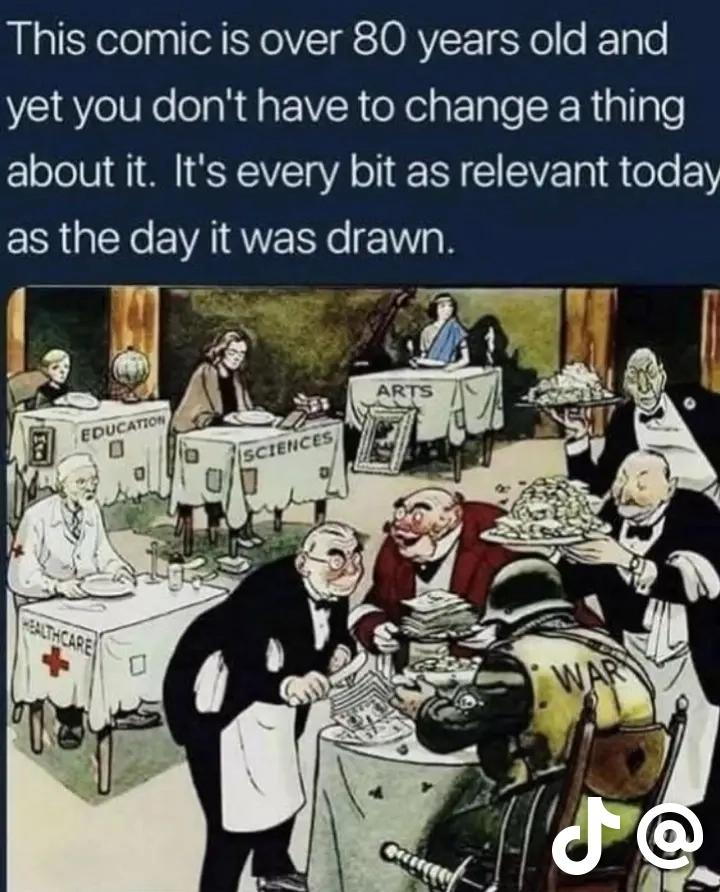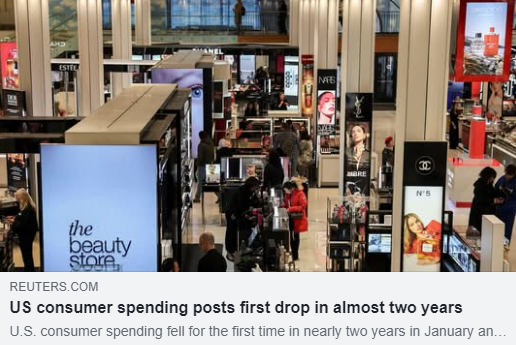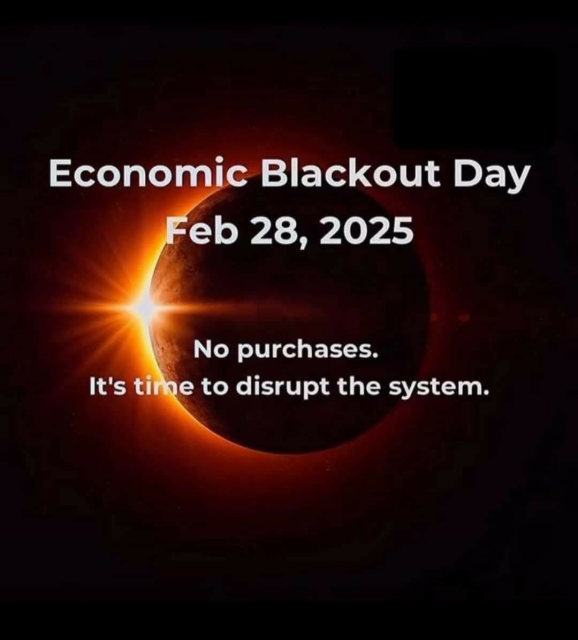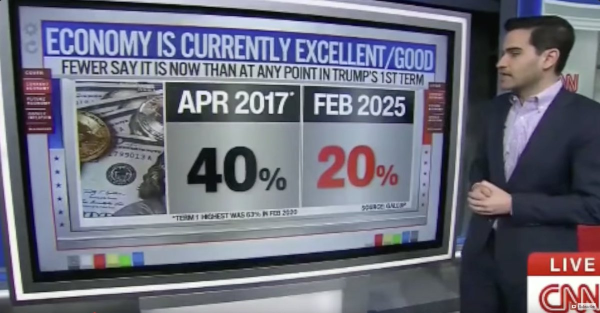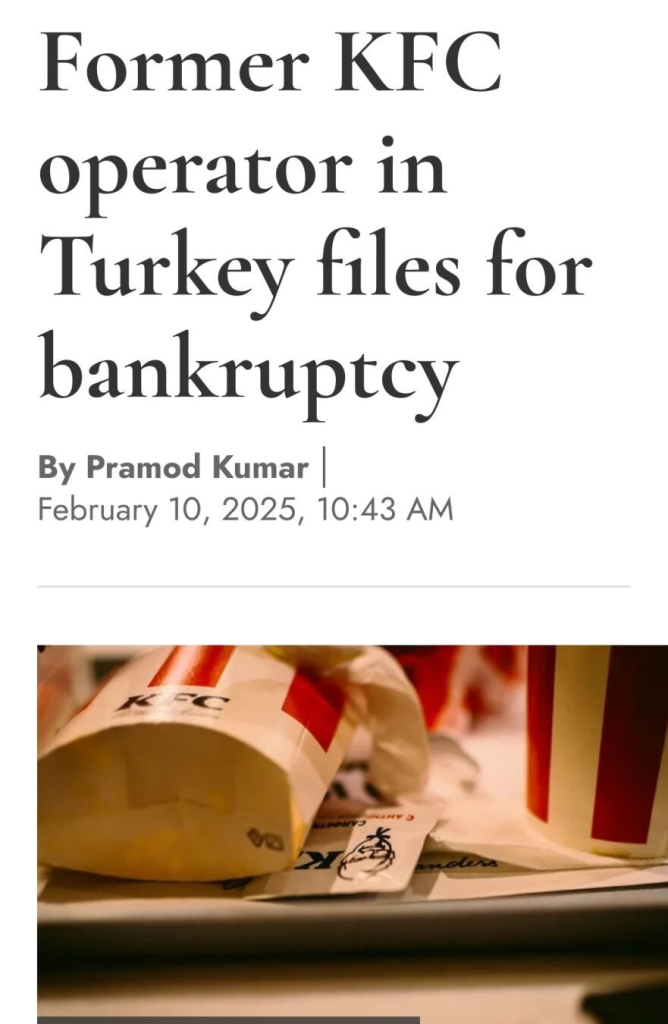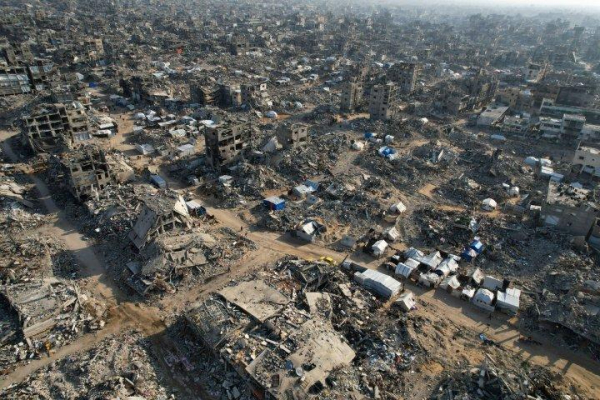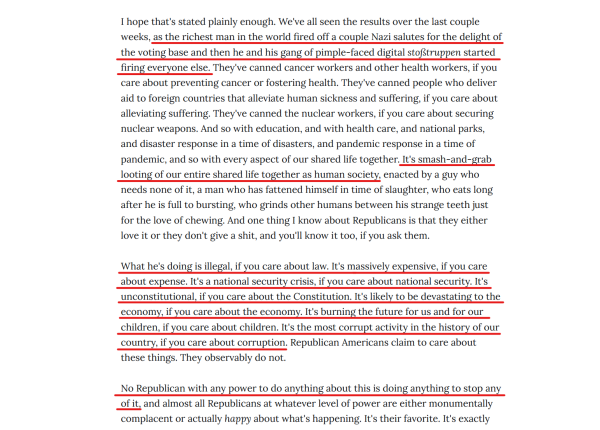Suche
Beiträge, die mit Economy getaggt sind
NASDAQ back to Nov 2024
S&P500 back to Nov 2024
Will Republicans continue to destroy the #UnitedStates #middleclass #economy?
#Mexico #tariffs begin Monday!
#tariff
#trump
#recession
#redwave
#inflation
#election2026
#2026election
"Costco CFO sounds alarm on consumer trend
Retailers could be in for a rough 2025.
70% of consumers say inflation has hurt their household finances.
And compounding matters is that #interestrates remain stubbornly high due to sticky #inflation. In January the Federal Reserve hit pause on interest rate cuts. And it’s likely to hold rates steady when it meets in mid-March"
#premarket
#recession
#Trump
#tariff
#tariffs
https://www.thestreet.com/retail/costco-cfo-sounds-alarm-on-consumer-trend
The S&P 500 has lost nearly all its gains since the election. Via his tariffs, Trump is "setting light to one of the world’s most integrated supply chains" and it appears that policy is "set on the president's whim." In fact, today, Trump announced plans for a near immediate 250% tariff on lumber & dairy products with Canada. 🇨🇦 Oh, Canada! Lord help us.
https://www.economist.com/leaders/2025/03/06/donald-trumps-economic-delusions-are-already-hurting-america #press #economy
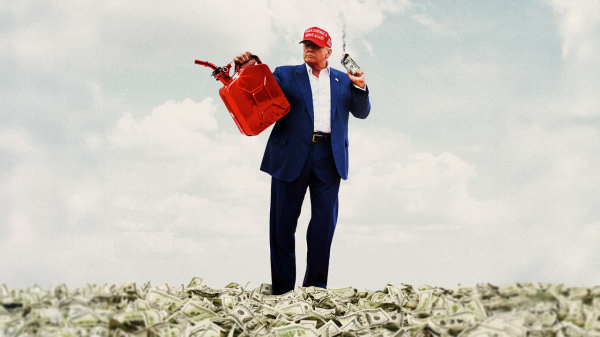
Donald Trump’s economic delusions are already hurting America
The president and reality are drifting apartThe Economist
by Another Angry Voice on Substack
@UKLabour
“It’s quite extraordinary that the Labour Party in the UK is operating far to the economic right of Germany’s incoming right-wing government, led by probably the most right-wing figure ever to lead the CDU”
https://open.substack.com/pub/anotherangryvoice/p/how-is-starmers-labour-so-far-to?r=27oltk&utm_medium=ios
#Press #UK #Labour #Starmer #Reeves #FarRight #Economy #Germant #Merz #Infrastructure #investment #Defence #Poor

How is Starmer's Labour so far to the economic right of Germany's incoming right-wing Chancellor?
How has Keir Starmer shifted Labour so far to the economic right that Germany's new rabidly right-wing Chancellor elect Friedrich Merz looks economically centre-left in comparison?Another Angry Voice
When did we decide this? Tax Billionaires out of existence! - EUROPE SAYS
When did we decide this? Tax Billionaires out of existence!https://i.redd.it/wygfux9la3ne1.jpegby xena_lawlessEUROPE SAYS (EUROPESAYS.COM)
#Squakbox
Tell Republicans to keep shooting themselves and #Democracy on 5th avenue.
Republicans lost the middle class #economy.
#investing
#premarket
#inflation
#election2026
#2026election
#MalignantNarcissism #FOTUS #Tariffs #Economy
https://www.axios.com/2025/03/05/tariffs-canada-mexico-trump
Oh yeah, Captain Orange von Fuckitup.
#Trump #MAGA #economy
https://www.reuters.com/markets/us/us-consumer-spending-falls-january-monthly-inflation-rises-2025-02-28/
„Israel’s move to prevent all aid from entering the Gaza Strip after Hamas reportedly refused to accept a plan to continue with phase one of the fragile ceasefire has had an immediate impact, including a 100-fold increase in the price of flour and vegetables.“
https://news.un.org/en/story/2025/03/1160731

Food prices soar as Israel blocks aid into Gaza
Israel’s move to prevent all aid from entering the Gaza Strip after Hamas reportedly refused to accept a plan to continue with phase one of the fragile ceasefire has had an immediate impact, including a 100-fold increase in the price of flour and veg…UN News
by Another Angry Voice on Substack
@UKLabour
“Keir Starmer's military spending splurge is characterised by dishonesty about where the money is coming from, and dishonesty about the consequences”
https://open.substack.com/pub/anotherangryvoice/p/keir-starmer-dishonest-military-splurge?r=27oltk&utm_medium=ios
#Press #UK #Labour #Starmer #Military #Spending #Dishonesty #Delusion #Ukraine #Putin #Russia #Economy #Growth #PermanentWar #BAESystems #Thales #GeneralDynamics #Babcock #LockheedMartin #RollsRoyce

Keir Starmer is being dishonest about his military spending splurge
Keir Starmer's military spending splurge is characterised by dishonesty about where the money is coming from, and dishonesty about the consequences.Another Angry Voice
According to recent data from the Central Bureau of Statistics, there was a 1.4 percent decline in GDP in the second quarter of 2024 compared to that of 2023. As for business GDP, there was a serious decline of 4.8 percent in the second quarter of 2024, which meant that the economy was entering a recession. The volume of exports also declined by 8.1 percent, imports of goods and services dropped by 9.8 percent, and real estate investments slowed by 16.9 percent.6
According to the Ministry of Finance and the Bank of Israel, expected growth in 2023 declined from 3 percent to 1.5 percent. There are predictions of a slowdown in growth for 2024 from 3 percent to around 1.7 percent.7 If the natural increase in population is taken into account, there is zero growth in 2024. The Aaron Institute for Economic Policy at Reichman University predicts that economic growth in 2024 will be negative, reaching -3.1 percent, which means a decline in GDP per capita by 5 percent; that the GDP fiscal deficit will reach about 9 percent; and that the ratio of external debt to GDP will reach 71 percent.8 The Institute also estimates economic growth to be about 1.7 percent in 2025, and a decline in the deficit to 7.8 percent of output, while external debt will rise to 76 percent of GDP."
https://arabcenterdc.org/resource/the-estimated-cost-of-the-gaza-war-on-the-israeli-economy/
#Israel #Palestine #Gaza #Economy
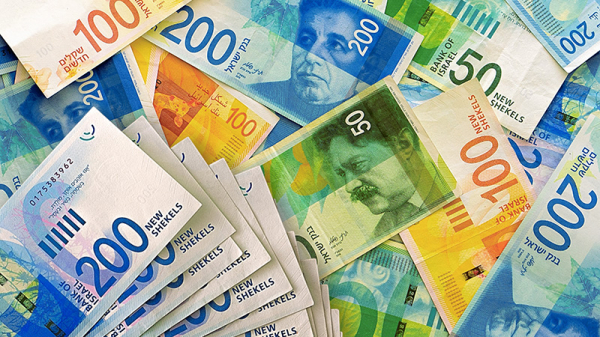
The Estimated Cost of the Gaza War on the Israeli Economy
More than a year after the Hamas attack on the towns of the so-called Gaza envelope, it has become clear that the economic and financial cost of Israel’s genocidal war on the Gaza Strip and its expansion into Lebanon will be very high.Arab Center Washington DC
Don't have much confidence in American public, even a day without buying shit is too much of a sacrifice for majority of them.
I really hope they prove me wrong, even though a day won't do shit in reality, it requires consistent and long term actions to really hurt these oligarchs.
#NoBuyDay #Blackout #Protest #USpol #Economy #Trumpistan #Politics
Serbian president apologises for voting ‘yes’ to UN resolution on Ukraine
'As far as the American resolution is concerned, we voted exactly as it should have been. We abstained. We should have abstained, in my opinion, from the European resolution as well.BYTESEU (Bytes Europe)
The Svobodnaya Pressa website published an article on cryptocurrency by V. Katasonov —
In it we find curious data, so the author reports:
“A significant part of all information and communication technologies is realized precisely in the sector of non-productive, redistributive services. This is, first of all, electronic banking (EB) and electronic commerce (EC). This is by far the main part of the “digital economy”. But ultimately, the goal of “digitalization” of banking and commerce is to increase profits. And profit, as we know, is a centuries-tested tool with which capitalists redistribute the social product in their favor. Profit is the legalized stealing of society under capitalism. There can be no question of increasing the “public welfare””.
The author goes on to point out that the digital economy is by no means as harmless a phenomenon as it may seem at first glance. First, it draws away a significant number of the working-age population:
“There are only expert estimates available for employment in the 'digital casino'. Worldwide, the number of people employed in mining is already in the tens of millions. So far, this type of activity is mainly of a “gray”, “shadow” nature”.
Secondly, the “mining” (mining) of virtual money consumes a significant amount of energy resources:
“The insanely high energy intensity of digital mining has long been written and talked about by many experts. For many individual “miners” (those who “mine” cryptocurrency), the costs of “mining” become unaffordable. They begin to “optimize” them by, for example, stealing electricity. Or by moving their “mining” capacities to countries with lower electricity tariffs. But the main way has become what textbooks on the Marxist political economy of capitalism call “concentration” and “monopolization” of production and capital. What is happening is the consolidation of individual “miners” into “pools”. Bitcoin mining today is dominated by three large pools, which account for 55% of all computing power. In fact, there is a rapid monopolization in the field of cryptocurrencies.
According to statistics from the Digiconomist information and analytical center, at the end of last year, the annualized energy consumption of the bitcoin network reached 35.77 TWh. This is more than the annualized energy consumption of Denmark (33 TWh), Belarus (33.8 TWh) or Bulgaria (34.9 TWh). A year ago, bitcoin accounted for 0.16% of global electricity consumption. By the end of this year, that share is projected to rise to 0.5%. And with many other cryptocurrencies available, the “digital casino” could currently siphon off as much as 1 percent of all electricity generated globally. Obviously, the estimates are very rough, primarily because some of the electricity is siphoned off illegally. But the trend is obvious: the cryptocurrency “parasite” will increase both in absolute and relative terms the scale of such energy “sucking”.”
“Indeed,” the author summarizes, ‘the real price that humanity will have to pay for its dangerous games called ’digital economy' is infinitely high. “The digital economy is leading to the destruction of the real economy by parasitically sucking out of it very real resources - human, energy and financial resources.”
Having collected good data, Katasonov, being a bourgeois-patriotic economist, makes false political conclusions. The meaning of the author's position: stop parasitizing on the electric industry, go to work in factories. Here the well-known trick of dividing the bourgeoisie into “industrious producers” and “speculators-parasites” is used, of course, in order to support the former against the latter.
The proletariat needs to get rid not of any kind or subspecies of capitalists, but of the DICTATURE OF THE BURJUAZI as a class. The aim of every capitalist is not to satisfy the needs of the population, as it is written in textbooks, but to satisfy the thirst for maximum profit, so if it is more profitable for a capitalist to invest capital in a “crypto-farm” than in building a factory, he will organize a “crypto-farm”, and he doesn't care what the consequences for society will be. The problem of capitalism is not the wrong capitalists, but the OBJECTIVE LAWS of the economy, which produce TYRANNY towards the proletariat and the people as a whole.
“Mining” is a socially useless industry - a typical regurgitation of the market economy, it can be compared to rent, stock speculation or a thousand other legitimate phenomena of capitalism. Getting rid of the “parasitic” types of capitalists (in fact ALL of them are parasites) is the desire of their competitors for more profit, i.e. it is not in the interests of the proletariat.
However, the political danger of “mining” is the growth and support of petty-bourgeois sentiment, which is very favorable to the capitalist class as a whole. The more people believe that it is possible to survive without working for corporations, the more stable capitalism as a whole is. This is why bourgeois states look at cryptocurrencies leniently, and in some cases even support them.
Marx, as we know, called the petty bourgeoisie a disappearing stratum, and indeed in market conditions the petty bourgeois have one fate - proletarianization, but they continue to exist mainly due to the “social” policy of bourgeois states, which see them as a social pillar of capitalism.
In addition, bourgeois states poorly regulate cryptocurrencies because of the laundering of criminal proceeds, and the mafia has a large lobby in almost all bourgeois countries.
#lang_en
О криптовалюте
На сайте «Свободной прессы» вышла статья В. Катасонова о криптовалюте —
В ней мы находим любопытные данные, так автор сообщает:
«Значительная часть всех информационно-коммуникационных технологий реализуется именно в секторе непроизводительных, перераспределяющих услуг. Это, прежде всего, электронный банкинг (ЭБ) и электронная коммерция (ЭК). Это на сегодняшний день основная часть „цифровой экономики“. Но, в конечном счете, целью „цифровизации“ банковского и торгового дела является наращивание прибыли. А прибыль, как известно, и есть проверенный веками инструмент, с помощью которого капиталисты перераспределяют общественный продукт в свою пользу. Прибыль — узаконенное при капитализме обворовывание общества. Ни о каком приумножении „общественного благоденствия“ речи быть не может».
Далее автор указывает, что «цифровая экономика» отнюдь не такое безобидное явление, как это может показаться на первый взгляд. Во-первых, она оттягивает значительное число трудоспособного населения:
«Имеются лишь экспертные оценки по занятости в „цифровом казино“. По всему миру число занятых майнингом уже исчисляется десятками миллионов человек. Пока данный вид деятельности носит в основном „серый“, „теневой“ характер».
Во-вторых, «добыча» (майнинг) виртуальных денег пожирает значительное число энергоресурса:
«О безумно высокой энергоемкости цифрового майнинга уже давно писали и говорили многие эксперты. Для многих индивидуальных „шахтеров“ (те, кто „добывает“ криптовалюту) издержки „добычи“ становятся не подъемными. Они начинают „оптимизировать“ их, занимаясь, например, кражей электроэнергии. Или выводя свои мощности по „добыче“ в страны с более низкими тарифами на электричество. Но магистральным путем стало то, что в учебниках по марксистской политэкономии капитализма называется „концентрацией“ и „монополизацией“ производства и капитала. Происходит объединение индивидуальных „шахтеров“ в „пулы“. В майнинге биткойна сегодня доминирует три крупных пула, на которые приходится 55% всей вычислительной мощности. Фактически в сфере криптовалют происходит стремительная монополизация.
Согласно статистике информационно-аналитического центра Digiconomist, на конец прошлого года энергопотребление сети биткойн в приведении к годовому счислению достигло 35,77 ТВт/ч. Это больше, чем годовое энергопотребление Дании (33 ТВт/ч), Беларуси (33,8 ТВт/ч) или Болгарии (34,9 ТВт/ч). Год назад на биткойн приходилось 0,16% мирового потребления электроэнергии. На конец этого года прогнозируется, что эта доля увеличится до 0,5%. А с учетом того, что имеется множество других криптовалют, „цифровое казино“ в настоящее время может отсасывать до 1 процента всей электроэнергии, генерируемой в мире. Очевидно, что оценки очень приблизительные, прежде всего потому, что часть электроэнергии отсасывается нелегально. Но тенденция очевидна: криптовалютный „паразит“ будет наращивать и в абсолютном, и в относительном выражении масштабы такого энергетического „отсоса“».
«Действительно, — подытоживает автор, — реальная цена, которую человечеству придется заплатить за свои опасные игры под названием „цифровая экономика“, бесконечно высока. „Цифровая экономика“ ведет к разрушению реальной экономики путем паразитического высасывания из нее вполне реальных ресурсов — человеческих, энергетических и финансовых».
Собрав неплохие данные, Катасонов, будучи буржуазно-патриотическим экономистом, делает ложные политические выводы. Смысл позиции автора: долой паразитирование на электрике, идите работать на заводы. Здесь пускается в ход известный трюк с разделением буржуазии на «трудолюбивых производителей» и «спекулянтов-паразитов», разумеется, с целью поддержки первых против вторых.
Пролетариату необходимо избавиться не от каких-то видов или подвидов капиталистов, а от ДИКТАТУРЫ БУРЖУАЗИИ как класса. Цель всякого капиталиста не в удовлетворении потребностей населения, как это пишут в учебниках, а в удовлетворении жажды максимальной прибыли, поэтому если капиталисту выгоднее вложить капитал в «криптоферму», чем в строительство завода, то он организует «криптоферму», и плевать ему на то, какие будут последствия для общества. Проблематика капитализма состоит не в неправильных капиталистах, а в ОБЪЕКТИВНЫХ ЗАКОНАХ экономики, которые порождают ТИРАНИЮ по отношению к пролетариату и народу в целом.
«Майнинг» есть отрасль общественно-бесполезная — типичная отрыжка рыночной экономики, его можно сравнить с рентой, биржевыми спекуляциями или тысячью других закономерных явлений капитализма. Избавление от «паразитических» типов капиталистов (на самом деле ВСЕ они паразиты) является стремлением их конкурентов к большей прибыли, т. е. не отвечает интересам пролетариата.
Однако же политическая опасность «майнинга» состоит в росте и поддержке мелкобуржуазных настроений, что весьма выгодно капиталистическому классу в целом. Чем больше людей верят, что можно выжить без работы на корпорации, тем устойчивее капитализм в целом. Именно поэтому буржуазные государства смотрят на криптоденьги снисходительно, а кое-где даже оказывают поддержку.
Маркс, как известно, называл мелкую буржуазию исчезающей прослойкой, и действительно в рыночных условиях у мелких буржуа одна судьба — пролетаризация, однако они продолжают существовать в основном благодаря «социальной» политике буржуазных государств, которые видят в них социальную опору капитализма.
Кроме того, буржуазные государства слабо регулируют криптовалюты из-за отмывки преступных доходов, а мафия имеет крупное лобби практически во всех буржуазных странах.
#lang_ru
(2018)
#economy #mining #cryptocurrency #finance #capitalism #study for #future

О криптовалюте
О криптовалюте На сайте «Свободной прессы» вышла статья В. Катасонова о криптовалюте — http://sss.agybvxkyyg.cgxa.fr2.gsr.awhoer.diaspora* social network
In addition to MTV, the deal also includes Sweden's TV4.
https://yle.fi/a/74-20145811
#Media #Domestic #Business #Economy #Society #WorkingLife
If we consider the history of human civilization through the eyes of an engineer, it looks extremely logical and slender. The whole history is an evolutionary development of new types of energy, energy resources and technologies of their extraction, processing and utilization. From human muscle power to the muscle power of domestic animals, to the use of wind and flowing water energy, to the energy of hot springs, to the energy of chemical reaction of combustion using first different types of wood, peat, then coal, oil, to the conquest of the laws of electrodynamics, to the use of natural gas and to the current peak of the level of energy development - to the energy of the atomic nucleus. What kind of -isms happened along the way? Feudalism, capitalism, imperialism, socialism and capitalism again? It is absolutely indifferent, just white noise, that's all. Only the pace of development of these technologies is important - after the slumber of the first 18 centuries AD, the pace began to pick up, which was maximum during the years of planned development due to state efforts. This -ism we call socialism, so we can simply fix: since socialism gave the maximum rate of development of the energy sector, this economic and political system is optimal for the energy sector.
The peak of energy development in the USSR, which, like modern Russia, was the northernmost country in the world, was that its electricity and heat were the cheapest on the planet. Socialism was removed - came the notorious adjustment of energy tariffs every year and a half. Rational? No. No, because it hinders the development of living standards, hinders the development of the economy in its entire complex - in industry, in agriculture, in transportation. I'm not good at philosophy and political science, but I know for sure: centralized long-term planning was optimal for the development of the energy sector and, consequently, civilization.
#Russia #USSR #soviet #planning #economy #enegry #socialism #capitalism #history #study for #future
What the western hypocrites happily forget about the disgusting legacy of British rule and the role monarchy played in looting the nations across the globe.
#UK #britain #england #british #monarchy #anglo-saxons #colonialism #antihumanity #poverty #economy #India #indian #history
what the western hypocrites happily forget about the disgusting leg...
what the western hypocrites happily forget about the disgusting legacy of British rule and the role monarchy played in looting the nations across the globe.diaspora* social network
This was even before the explosion of the three strings of Nord Stream and before the Russian special military operation in Ukraine.
https://colonelcassad.livejournal.com/7116422.html
#eu #europe #economy #energy #naturalgas #price #graph #history #blameRussia
If, for the first time, when Germany defeated France in 1871, it was imposed reparations of 5 billion francs in gold, then, in the second confrontation, reparations were imposed on Germany and already in a much larger amount, and was the equivalent of 100,000 tons of gold. For comparison, eight thousand tons were stored at Fort Knox. Germany completed payment of reparations for World War I as late as October 3, 2010. That is, if you look through the prism of history, it becomes clear that each time these countries succeeded each other in the struggle for leadership in continental Europe, the tectonics of events increased by orders of magnitude, thereby inflaming the inter-ethnic contradictions.
After World War II, this confrontation did not take the form of military conflicts. Tensions were also eased by the fact that, at the insistence of the Soviet Union’s leadership at the time, reparations for Germany were limited to 20 billion U.S. dollars. Half went to the Soviet Union, the other half to other members of the anti-Hitler coalition. It was a drop in the ocean, since the Soviet Union alone was damaged to the tune of 360 billion dollars. Thus, one factor of contradiction was leveled. Europe gained the long-awaited peace.
#lang_en
Откуда в Европе мир и о “кровожадности” Сталина
Если, в первый раз, когда Германия взяла верх над Францией в 1871 году, на нее были наложены репарации в размере 5 миллиардов франков золотом, то уже во втором противостоянии репарации были наложены на Германию и уже в куда большем размере, и составляли сумму, эквивалентную 100 000 тонн золота. Для сравнения: в Форт-Ноксе хранится восемь тысяч тонн. Германия завершила выплату репараций за Первую мировую войну только аж 3 октября 2010 года. То есть, если посмотреть через призму истории, то становится понятно, что с каждым разом, когда эти страны сменяли друг друга в борьбе за лидерство в континентальной Европе, тектоника событий увеличивалась на порядки, разжигая таким образом межнациональные противоречия.
После Второй мировой войны это противостояние не вылилось в форму военных конфликтов. Напряжение было снято и благодаря тому, что по настоянию тогдашнего руководства Советского Союза репарации для Германии были ограничены 20 миллиардами долларов США. Половина пошла в пользу СССР, вторая половина – остальным участникам антигитлеровской коалиции. Это было каплей в море, так как одному только Советскому Союзу был нанесен ущерб в размере 360 миллиардов долларов. Таким образом, один из факторов противоречий был нивелирован. Европа обрела долгожданный мир.
#lang_ru
#WWII #WW2 #Russia #USSR #soviet #russian #Stalin #germany #france #europe #war #WWI #WW1 #reparations #economy #СССР #история
О лидерстве Германии и Франции в Европе
...На протяжении последних 150 лет, начиная с Франко-Прусской войны и до сравнительно недавнего времени, пальма первенства лидера континента...www.toalexsmail.com
Syria needs +50 years to recover to pre-war economy, UN report - EUROPE SAYS
2025-02-21T06:15:34+00:00 font Enable Reading Mode A- A A+ Shafaq News/ Syria’s economy will take 55 years to returnEUROPE SAYS (EUROPESAYS.COM)
https://www.agbi.com/food-drink/2025/02/former-kfc-operator-in-turkey-files-for-bankruptcy/
#BDS #Boycott #Israel #Gaza #Economy #Genocide
@palestine@lemmy.ml @palestine@a.gup.pe @israel@a.gup.pe
Former KFC operator in Turkey files for bankruptcy | AGBI
IS Gida CEO Ilkem Sahin said that the company faces debt of billions of Turkish liras, with immovables seized by banks and state institutionsPramod Kumar (Arabian Gulf Business Insight)
https://www.agbi.com/food-drink/2025/02/former-kfc-operator-in-turkey-files-for-bankruptcy/
#BDS #Boycott #Israel #Gaza #Economy #Genocide
@palestine@lemmy.ml @palestine@a.gup.pe @israel

Former KFC operator in Turkey files for bankruptcy | AGBI
IS Gida CEO Ilkem Sahin said that the company faces debt of billions of Turkish liras, with immovables seized by banks and state institutionsPramod Kumar (Arabian Gulf Business Insight)
The Interim Rapid Damage and Needs Assessment said that US$53.2 billion is needed for recovery and reconstruction over the next 10 years.
#reconstruction #damage #assessment #economy #Gaza #World
https://globalnews.ca/news/11023713/rebuilding-gaza-cost-world-bank-joint-assessment/
The Interim Rapid Damage and Needs Assessment said that US$53.2 billion is needed for recovery and reconstruction over the next 10 years.
#reconstruction #damage #assessment #economy #Gaza #World
https://globalnews.ca/news/11023713/rebuilding-gaza-cost-world-bank-joint-assessment/
One issue raised during today’s meeting in Riyadh was how much money American companies lost by having to leave the Russian market, due to sanctions. The total to date exceeds $300 billion. Biggest losers, according to Eurasia and Multipolarity:#russophobia #US #american #money #fail #economy #sanctions against #Russia
– Exxon suffered a $4 bln write down on its Russia-related businesses
– McDonald’s recorded a $1.4 bln non-cash write off in 2022 attributed to its Russia exit
– General Motors lost $657 mln
– Google’s Russian subsidiary declared bankruptcy in 2023 with debts totaling $587 mln. A Russian court has fined the company $2.5 decillion for restricting Russian media channels on YouTube
– Whirlpool recorded $400 mln in Russia losses
– Coca-Cola lost $195.4 mln
– Disney reported $195 mln in losses from “depreciation of intangible assets” in Russia in 2022
– IBM recorded $300 mln in losses in 2022, blaming Russia and inflation for 3,900 slashed jobs
– Starbucks suffered undisclosed losses after closing its 130 Russian coffee shops, accounting for nearly 1% of global sales
– Microsoft lost $126 mln
– Ford took a $122 mln hit
– Nvidia lost $100 mln
– Apple recorded $79.3 mln in losses
– Xerox faced $80 mln in losses in Q4 2023
– Adobe reported $75 mln from lost payments in Russia and Belarus
– Netflix cut off 700,000 Russian subscribers (about $55.1 mln in potential losses, although some Russians switched their accounts to other regions)
– John Deere halted production at a 100,000 sq. m facility it had pumped over $40 mln into from 2005-2022. Caterpillar, which left in 2024, saw Russia earnings fall from $64.5 mln in 2021 to $2.3 mln in 2023
– Visa and Mastercard recorded $35 and $30 mln in losses, respectively in 2022
– HP wrote off $23 mln
– Cisco went $20.3 mln into the red
– Oracle lost $13.7 mln
– Western Union reported a 2% hit to 2022 revenues due to loss of the Russian and Belarusian markets
Susan Singer (@slsinger@mastodon.online)
1.43K Posts, 220 Following, 169 Followers · #Socialist for decades. Now #disabled and ENTIRELY out of patience. Posting mostly on political topics. I'm the GovGeek™ on Patreon: https://www.patreon.Mastodon
https://www.the-reframe.com/the/
"What he's doing is illegal, if you care about #law... It's a #NationalSecurity crisis, if you care about national #security. It's unconstitutional, if you care about the #Constitution. It's likely to be devastating to the #economy, if you care about the economy... It's the most corrupt activity in the history of our country, if you care about #corruption."
- @JuliusGoat
#Musk #Coup #Republicans #Trump #Politics #USPol #US #USA #Media
The Worst and the Dimmest
It's not a coincidence that we're being led by the least qualified monsters available; it's a deliberate strategy. Facing the Worst - a series about directional alignment.A.R. Moxon (The Reframe)
Trump administration begins firings of FAA staff just weeks after fatal D.C. plane crash - EUROPE SAYS
Washington — The Trump administration has begun firing several hundred Federal Aviation Administration employees, upending staff on aEUROPE SAYS (EUROPESAYS.COM)
https://youtu.be/4DjpjgOln-U
#us #economy
So what we see here - from '1938 to '1944. In the first place, for someone is war, and for someone is holiday - in the U.S.A. - Canada +16% increased consumption of everything.
What positions have fallen on the small island, which although not as much as the continent, but still got it:
public transportation +13% and mail +8% is understandable, as is alcohol and tobacco +8%,
but entertainment +10%, books +1% … In Canada it seemed like they were having fun with amusements +53%. That was a lot of fun.
https://aftershock.news/?q=node%2F1141776
#WWII #WW2 #UK #britain #england #british #USA #US #american #Canada #canadian #economy during #war #history #capitalism #lang_en
“The Mafia State”
by Chris Hedges in The Chris Hedges Report on Substack
@UKLabour take note!
“The mafia state cannot be reformed. We must organize to break our chains, one-by-one, to use the power of the strike to cripple the state machinery”
https://open.substack.com/pub/chrishedges/p/the-mafia-state?r=27oltk&utm_medium=ios
#Press #US #Trump #Musk #Mafia #State #Poverty #Immiseration #Decline #Destruction #Billionaire #Economy #Control #Surveillance #Project2025 #Christian #Fascist #MagicalThinking #Capitalism

The Mafia State
First we got a mafia economy. Then we got a mafia state. We must rid ourselves of the ruling criminal class or become its victims.Chris Hedges (The Chris Hedges Report)
USSR in 1937
src: https://colonelcassad.livejournal.com/6981559.html
Working family budget
SVERDLOVSK, September 28. (Corr. “Pravda”). The Sverdlovsk Regional Department of National Economy Accounting is systematically studying the budget of 472 working families. The results are very revealing. They show tremendous growth of workers’ welfare.
In 1932 the annual salary of the head of the family averaged 3764 rubles, in 1936 - 7884 rubles,
In the first 8 months of the year it was 8,359 rubles. The wages of the families surveyed in 1937 increased by 329 percent compared with 1932.
So how is this money spent? For food in 1932 each spent on average 2,220 rubles, and in the 8 months of this year 5,934 rubles were spent. This increase is due to a dramatic improvement in nutrition, chiefly at the expense of fats, dairy products, and fruit. Spending on clothing and furniture more than doubled. Spending on theater, cinema, and the purchase of literature increased by 236 percent in six years.
#lang_en
Бюджет рабочей семьи
СВЕРДЛОВСК, 28 сентября. (Корр. “Правды”). Свердловское областное управление народнохозяйственного учета систематически изучает бюджет 472 рабочих семей. Результаты чрезвычайно показательны. Они говорят о колоссальном росте благосостояния рабочих.
В 1932 г. годовая заработная плата главы семьи составляла в среднем 3764 руб., в 1936 г. - 7884 руб.,
а за 8 месяцев этого года - 8359 руб. Заработная плата обследованных семей в 1937 году по сравнению с 1932 годом выросла на 329 процентов.
Как же эти деньги расходуются? На питание в 1932 г. каждая в среднем тратила 2220 руб., а за 8 месяцев этого года израсходовано 5934 руб. Этот рост объясняется резким улучшением питания, главным образом за счет жиров, молочных продуктов, фруктов. В два с лишним раза выросли расходы на покупку одежды и мебели. Затраты на театр, кино и приобретение литературы выросли за шесть лет на 236 процентов.
Also in 1937 was the first ever non-stop flight from the USSR to the United States
https://ru.wikipedia.org/wiki/Беспосадочный_перелёт_Москва_—Северный_полюс—_Ванкувер
Moscow meets the participants of the Moscow - North Pole - Vancouver flight: Georgy Baidukov, Alexander Belyakov and Valery Chkalov. Author Ivan Shagin. 1937

#Russia #USSR #soviet #russian #history #Stalin #economy #aviation #lang_ru #1937 #СССР #история #экономика



